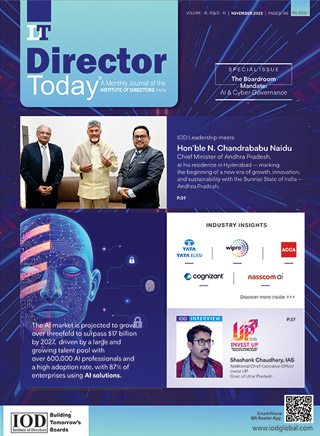The Shift to Autonomous Enterprises: A Governance Blueprint for Boards

India's digital transformation is accelerating at an unprecedented pace. Industry 4.0 and initiatives like the India-AI Impact Summit 2026 are redefining how businesses operate, compete, and create value. In this context, the November edition of Director Today rightly focuses on “The AI & Cyber Imperative: A New Governance Mandate for the Boardroom.”
This is not about adopting another technology trend. It is about preparing for a future where enterprises operate autonomously, powered by Agentic AI - intelligent systems that perceive, reason, and act independently. For boards, this is a defining moment: decisions made today will shape resilience, trust, and competitiveness for decades to come.
From Automation to Autonomy
For years, automation simplified processes and analytics informed decisions. Generative AI added creativity and scale. But Agentic AI marks a structural shift. These systems do not wait for instructions they plan, decide, and act dynamically across interconnected workflows.
Imagine a customer service ecosystem where autonomous agents resolve issues proactively, or a financial close process executed entirely without manual intervention. This is the promise of autonomy. Yet, with this promise comes complexity. Boards must ask: How do we ensure autonomy does not erode accountability? How do we safeguard trust when decisions are increasingly machine-led?
Generative AI added creativity and scale. But Agentic AI marks a structural shift.

Governance in the Age of Autonomy
Agentic AI amplifies governance challenges. Identity sprawl, rogue agents, and cascading vulnerabilities are real risks. Cybersecurity is no longer a back-office concern, it is a board-level priority. A breach in an autonomous ecosystem can propagate faster than any human-controlled process.
Governance must evolve from static oversight to dynamic orchestration of trust. This means embedding ethics, security, and resilience into every layer of AI deployment. It also means anticipating risks before they materialize because in an autonomous enterprise, the speed of failure can be as rapid as the speed of success.
Culture and leadership must converge to create an environment where AI augments human judgment rather than replacing it.
Boards should lead by setting clear expectations:
• Continuous Risk Monitoring instead of periodic reviews.
• Ethical Guardrails to ensure algorithms align with organizational values.
• Cyber Resilience through fail-safe mechanisms and recovery protocols.
Beyond Risk: Driving Innovation and Growth
While risk management is critical, boards must also embrace their role as catalysts for innovation. Autonomous enterprises are not just about efficiency, they are about reinventing business models and creating new value streams.
This requires a deliberate approach:
• Grass-root Innovation: Encourage ideas from every level of the organization. Create platforms for employees to propose automation opportunities and AI-driven solutions.
• Funding and Scaling Pilots: Allocate dedicated budgets for experimentation, with clear pathways for scaling successful initiatives.
• Testing New Business Models: Use agentic systems to simulate markets, validate revenue models, and accelerate time-to-market.
• Workflow Automation Mandates: Direct leadership teams to identify processes ripe for automation. Not as a cost-cutting exercise, but as a strategic lever for resilience and agility.
Boards that institutionalize these practices will not only mitigate risk but also unlock growth.
Building Trust and Culture
Technology alone cannot guarantee trust. Culture and leadership must converge to create an environment where AI augments human judgment rather than replacing it. Upskilling directors in AI fluency is essential not to turn them into technologists, but to equip them with the foresight to ask the right questions.
Equally important is the collaboration between enterprises, regulators, and industry bodies to shape standards for Agent autonomy. Governance in the age of autonomy cannot be insular; it must be ecosystem-driven.
The Leadership Mandate
Agentic AI is not a project it is a transformation journey. Boards must embrace this journey with clarity of purpose, balancing innovation with responsibility. This calls for a mindset shift from viewing AI as a cost centre to recognizing it as a strategic lever for growth and resilience. It also demands humility the willingness to learn, adapt, and lead in an era where machines will increasingly share the decision-making table.
Conclusion
The shift to autonomous enterprises is inevitable. The imperative is to navigate this transition with wisdom and responsibility. Agentic AI offers a powerful lever for growth, but its promise will only be realized if boards act decisively while embedding trust, resilience, and ethics at the core of their governance mandate, and while enabling innovation from the grassroots to the boardroom.
Autonomy will shape the enterprise; governance will safeguard its core.
Author

Mr. Annadurai Elango
Currently serves as the President of Core Technologies and Insights at Cognizant. Prior to that, he held various leadership roles at Tata Consultancy Services for over 26 years. His previous roles include Group Head of IT infrastructure services, 360- degree strategic partnerships, regional sales, presales and delivery in the US, UK, Europe and APAC.
Owned by: Institute of Directors, India
Disclaimer: The opinions expressed in the articles/ stories are the personal opinions of the author. IOD/ Editor is not responsible for the accuracy, completeness, suitability, or validity of any information in those articles. The information, facts or opinions expressed in the articles/ speeches do not reflect the views of IOD/ Editor and IOD/ Editor does not assume any responsibility or liability for the same.

 Quick Links
Quick Links
 Connect us
Connect us




 Back to Home
Back to Home































